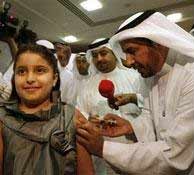This is the VOA Special English Health Report.
H1N1 flu continues to spread. Currently the virus is most active in the northern half of the world. But experts say it has become the leading influenza virus in all countries.
No one really knows how many people have gotten sick. H1N1, often called swine flu, was first reported in Mexico in April. Countries are no longer required to test and report individual cases. But close to half a million confirmed cases were reported to the World Health Organization as of November 1st.

The W.H.O. offices for the Americas and the Western Pacific reported two out of three of those cases. The agency says more than 6,000 people worldwide have died from H1N1.
W.H.O. special adviser Keiji Fukuda said last week that the virus has continued to act in some ways like seasonal flu. Most people recover without any need for interventions like antiviral drugs.
But in other ways H1N1 is different. It remained at unusually high levels in several countries during their summer months. And, unlike seasonal flu, younger people have suffered many of the serious cases and deaths from H1N1.
In the United States, cases of suspected influenza are at higher numbers than usual this early in the flu season. Experts at the Centers for Disease Control and Prevention say hospital treatment for likely H1N1 is most common among children up to four years old.
Health officials around the world are concerned about vaccine production. Wealthy countries have promised to donate ten percent of their H1N1 vaccine to poor countries. But there is a worldwide shortage.
The traditional way to make flu vaccine is to grow the virus in chicken eggs. Anthony Fauci at the National Institutes of Health says the shortage is an issue of biology. He says the companies that make vaccines cannot really do much when they have a virus that does not grow well.
In Saudi Arabia, officials are preparing for the Hajj, which starts this year during the last week of November. The event normally brings about three million Muslims from 160 countries to the holy city of Mecca.
Disease experts worry that H1N1 could spread easily in the crowds. The Saudis have a campaign to vaccinate health workers. They are also urging countries to vaccinate pilgrims making the trip. And they are advising against travel by children, pregnant women and other groups at highest risk.
And that's the VOA Special English Health Report, written by Caty Weaver. I'm Steve Ember.
antiviral drug:抗病毒药
Related stories:
Netizens upset over flu shots for hukou
WHO chief promises H1N1 vaccines for poorer nations
本土疫苗 homegrown vaccine
Do rich nations have obligation to help developing world tackle swine flu?
Flu vaccine production in pipeline
Pregnant women at greater danger from H1N1 flu
(Source: VOA 英语点津编辑)